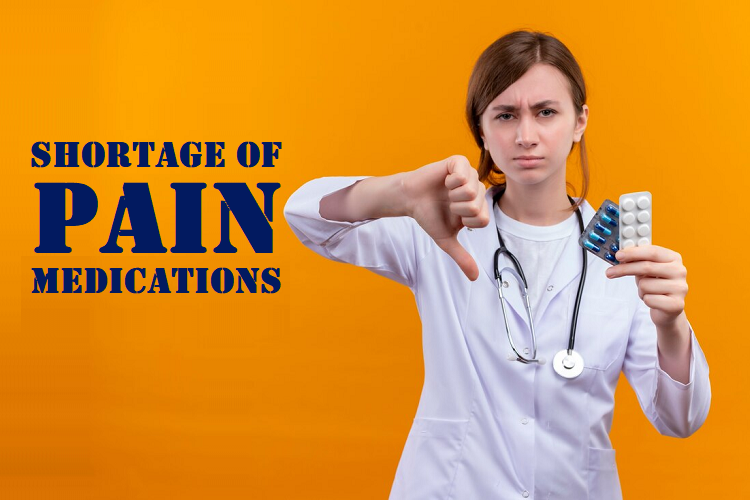The United States is experiencing a shortage of pain medications. These medications, including antibiotics, chemotherapy drugs, ADHD medications, and more, are causing concerns throughout the medical community and those who depend on the relief these medications provide.
The cause behind the shortage is largely unknown as drug companies aren’t required to report on why shortage of pain medications occur. Experts say that quality control and supply chain/manufacturing issues could be to blame.
One group of people who depend on these medications is chronic pain sufferers. We will discuss why this community is so ‘at-risk’ and what can be done to help those dealing with lifelong pain issues amidst the nationwide shortage.

Why the Shortage is So Dangerous for Those with Chronic Pain
Whether it stems from injury, illness, or other factors like cancer or fibromyalgia, chronic pain is challenging to deal with even under the best of circumstances. Those who suffer from chronic pain can have difficulty focusing and engaging in every aspect of their lives, such as school, work, hobbies, or even spending time with friends and family. The pain follows sufferers throughout their day and can make even basic things like sleep or eating difficult. Because of its debilitating nature, chronic pain can also lead to mental health disorders like depression and anxiety.
While medications can help mitigate their pain, prescription medication often makes the person suffering from chronic pain utterly dependent on the medicine for daily functioning. If a prescription runs out, the individual can’t afford it, or something like this ongoing drug shortage impacts their ability to obtain their medication, life can get very difficult very quickly.
The Risks of Turning to Unregulated Drugs
Unfortunately, chronic pain patients sometimes turn to illicit substances, street drugs, or unprescribed medications when shortages occur. These can include hazardous substances like the opioid drug fentanyl. Because illegal substances are unregulated, many take far more than intended because there’s no way to ensure the quality or quantity of ingredients in illicit substances.
Even if someone thinks they’re buying the same drug that they’re normally prescribed from an unauthorized source, there is no guarantee about what they are receiving. It could be cut with other, more dangerous (and cheaper) chemicals or another substance altogether. And this isn’t a rare problem: opioid overdose is the leading cause of death for Americans aged 18-45, according to the Drug Enforcement Administration.
Many people think that those who find themselves addicted to drugs are seeking pleasure, when in fact, pain avoidance (whether it’s chronic pain or the pain of withdrawal) is fuels many people’s substance use disorders (SUDs). This is one of the reasons that most prescription pain medications are heavily controlled substances: the addiction, withdrawal, and overdose potential is massive.
What To Do If You or a Loved One is Impacted by the Drug Shortage
While the government and pharmaceutical companies work out the supply chain and manufacturing issues, what should a chronic pain sufferer do in the meantime? Simply managing the pain without support is not an option for many people, and illicit substances are too dangerous to consider. If the recent pain medication shortage has impacted you or someone you know, here are some steps to take.
Step 1: Work with Your Doctor
The best thing you can do if your medication is not available is to speak with your doctor. They are trained and have the resources to find alternative drugs and therapy options. Sometimes, this means supplementing with another pain medication, communicating with other pharmacies in other areas, or finding other safe alternatives.
Step 2. Consider Alternative and Holistic Pain Options
With the support of your doctor, other, more holistic therapeutic interventions may provide relief. This will depend on your type of chronic pain, but holistic options can include:
- Clinically tested herbs and supplements
- Stretching and physical therapy
- Physical exercise as tolerated
- Diet, nutrition, and weight loss
- Breathing, meditation, and relaxation techniques
Again, all of these will need to be discussed with a doctor and will depend on the particular situation. While some chronic pain symptoms can’t be cured, many lifestyle, dietary, and mental health steps can be taken to manage both the pain and the emotional and psychological symptoms of living with chronic pain.
Step 3. Look Into Group and Individual Therapy
Therapeutic interventions, like Cognitive Behavioral Therapy, are effective in managing the effects of chronic pain. While therapies like CBT may not address the root of what causes the pain, they can help manage the emotional and psychological impacts of debilitating pain.
Therapy groups around the topic of chronic pain have also been shown to be helpful. Having a community of people who understand and empathize can do wonders for the mental health of the chronic pain sufferer. There are in-person and online groups to meet the scheduling needs and preferences of those who want to attend.
No matter what you decide to do for yourself or a loved one dealing with the effects of chronic pain, never try to manage it with street drugs or unprescribed medications. The risks, potential damage, or even death caused by unregulated medications mean that illicit substances should never be an option.
Conclusion
If you or someone you love is experiencing with a shortage of pain medications, is struggling with opioid dependence, or is otherwise considering managing their pain symptoms alone, reach out to a professional today. Trained doctors, mental health experts, and substance abuse professionals can support and assist in controlling pain despite the shortages.
If you are in San Diego and experiencing an issue with opioid dependence, contact Confidential Recovery at (619)452-1200. If you are elsewhere in the United States, contact the National Substance Abuse and Mental Health Hotline at 1-800-662-HELP (4357) for more resources.


